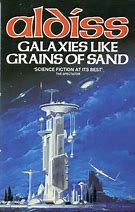In Poul Anderson's one volume future history, Tales Of The Flying Mountains (New York, 1984), individual short stories set during successive decades and generations of the colonization of the asteroids are linked by conversational passages set inside the first interstellar spaceship. (Another good conversationally linked series is Neil Gaiman's The Sandman: Worlds' End but that is not a linear history, more of a multitemporal cosmography.)
Anderson's cosy conversations sometimes serve the same purpose as Aldiss' cosmic commentaries. One of the speakers in Interlude 6 informs us that Earth became:
" '...steadily more comfortable, as material resources flowed in from space...The average Earthling took advantage of this opportunity to relax, to enjoy more leisure and security.' " (p. 250)
That is a relief. Until now, in this volume, the picture has been of Terrestrial resources strained by unemployed masses voting for expensive social welfare, then demonstrating and rioting if their standard of living is threatened.
The seventh story, "Recruiting Nation," confirms the rosier picture of a further future and even uses the term "Utopia," which is then explained as follows:
" 'Everywhere on Earth you can enjoy economic as well as physical security, a peaceful, orderly existence. If that starts feeling too stuffy, you can move into space. There the boom guarantees you can find work at high pay...' " (p. 272)
Terraformed asteroids have even become comfortable enough to breed "'...loafers...wastrels...'" (p. 273)!
Appropriately, this last story is set on the interstellar spaceship while it is being readied for flight. The narrator of the Prologue and Interludes, Winston P. Sanders, comes to the ship to solve a technical problem that turns out to have been a human problem (parts are not failing but the chief engineer is pretending that they are so that he can steal and sell them) and stays for the flight (as the new chief engineer). He ends the story in conversation with the man who is to become president of the civil government within the ship, Amspaugh. He and Amspaugh have been in the spaceship conversation from the Prologue so the flashbacks of the stories have at last caught up with the on-going narrative of the Interludes and the last story flows easily into the Epilogue. This is a very well crafted future history.

No comments:
Post a Comment